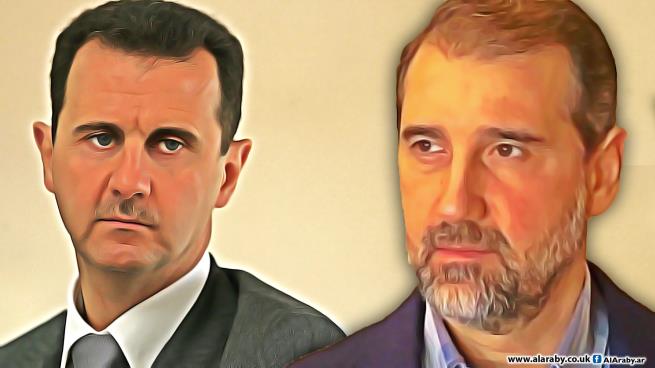Syrian businessman Rami Makhlouf, a cousin of Bashar al-Assad, is borrowing the logic of the saying “Assad or we burn the country” in his latest argument: “It’s me, or an economic flood.” If the argument only means one of the two options, then, unfortunately, for Assad to achieve both together means the survival of the regime at the cost of burning Syria.
Most likely, Makhlouf’s “series” will soon end, and all that will remain will be some small companies hidden within Syria, as well as companies, buildings and substantial funds owned by Rami Makhlouf and his family in a number of other countries, including Russia, Romania, Hungary, the UAE and others.
The Syrian regime has worked for nearly three years to remove Makhlouf’s fangs, as well as the strength he has garnered since his rise to power starting when he was young, amid Bashar al-Assad’s rehabilitation following Bassel’s death in 1994. With the start of the Syrian revolution in 2011, and the demonstrators’ chants against Makhlouf in particular, Rami and his father Muhammad and brother Hafez made a plan for their continued survival and influence. They feared that a team, even if weak, could have the regime accept a scapegoat of their cousin Atef Najib.
This plan is based on wealth and sect, and replacing the Baath Party with the Syrian Social Nationalist Party (SSNP). Among its parameters:
- Double the wealth, as it is considered to be the family’s treasury, and clean the reputation of these funds, as part of them go to the poor and another part go to Hezbollah, with matters ending with the founding of the Ramak Foundation for charitable works.
- Encouraging the regime to seek a security and military solution without mercy. Some regime departments consider Makhlouf to have a large role in adopting the security solution, as well as rejecting the political solution that was encouraged by some members of the regime. Foremost among them was then Vice President Farouq al-Sharaa and his assistant, Gen. Hassan Turkmani, and even Deputy Chief of Staff Gen. Assef Showkat, relying on the party and security, without interference from the sect as was the experience of Hafez al-Assad in the 1980’s during the conflict with the Muslim Brotherhood. Hafez Makhlouf devised a plan to arm and fund sectarian groups in Homs, as well as shabiha groups in Aleppo. The al-Bustan organization has been run, from its location in the Mezzeh 86 area, as well as areas of sectarian tension in Homs and Aleppo city, through its agent Abu Ali Qazaq, a retired officer from rural Jableh who lives in Aleppo, with cooperation from the al-Birri Militia.
- Restoring the historic link between the Makhlouf family and the SSNP. Days after Rami Makhlouf announced the abandonment of his economic activities toward charitable works, he swore affiliation to Issam al-Mahairi, an important symbol of the party, and a leader of what later came to be known as the General Secretariat.
- Supporting the formation of an Alawi religious authority, relying on a rapprochement with the Twelver Shia, with particular regards to worship and transactions. It is worth mentioning Rami’s attendance, with his parents, of Iraqi Shia sheikh Abdelhamid al-Muhajir’s lectures at the shrine of Sayyedia Ruqayya during Ramadan 1999, and his aunt Anisa’s support of Muhajir’s program on Syrian satellite television. This was halted due to a complaint from Sheikh Muhammad Saeed al-Bouti to Hafez al-Assad that Muhajir was stoking sectarian strife when he said on his program that the Prophet Muhammad, peace be upon him, was not followed by Khadija or Fatima, but by two other women, Ruqayya and Umm Kulthum, who were raised by the Prophet but were not his daughters.
- Rami Makhlouf has tried to build his own sectarian-based system, replacing the Baath Party with the SSNP. It is this card that Bashar al-Assad knows will guarantee his continuation. The limited conflict between Assad and Makhlouf will not change a thing with regards to corruption and plunder. Rather, the plunder of Assad and his wife will be managed directly.
This article was translated and edited by The Syrian Observer. The Syrian Observer has not verified the content of this story. Responsibility for the information and views set out in this article lies entirely with the author.


